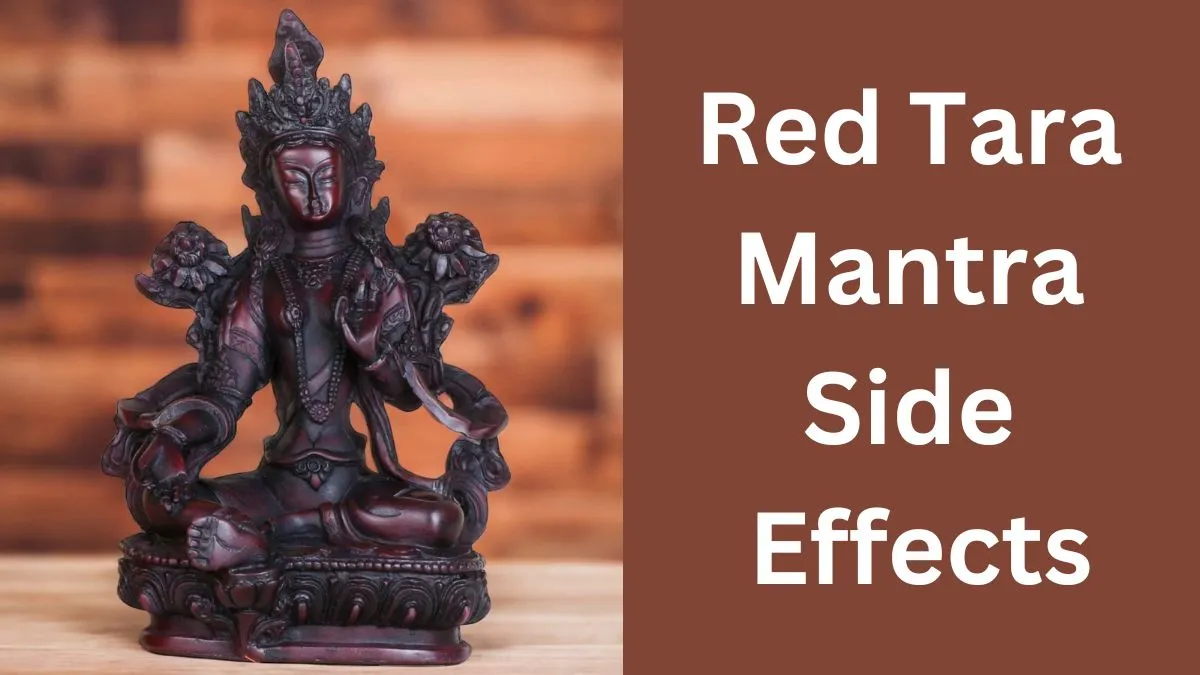Red Tara Mantra Side Effects : The Red Tara Mantra, a prominent and revered mantra within Tibetan Buddhism, is chanted by practitioners to invoke the blessings and protection of Red
Tara, a compassionate and powerful deity associated with love, compassion, and swift action. This mantra, like many sacred mantras, is believed to have profound spiritual and psychological effects on those who recite it regularly.
However, it’s essential to understand that there are no inherent “side effects” of chanting the Red Tara Mantra, but rather a range of potential benefits and considerations that come with dedicated practice.
At its core, the Red Tara Mantra consists of syllables and sounds that are believed to resonate with specific energies and frequencies, aligning the practitioner with the attributes and qualities associated with Red Tara herself.
Reciting this mantra is seen as a form of meditation and devotion that can lead to various transformative experiences, both on a spiritual and personal level.
One of the primary effects of regularly chanting the Red Tara Mantra is the potential for enhanced mindfulness and inner peace.
As with many mantra practices, this repetition of sacred sounds can help calm the mind, reduce stress, and promote a state of mental clarity. It can serve as a powerful tool for managing anxiety and cultivating a sense of tranquility in daily life.
Moreover, the mantra’s association with Red Tara, often referred to as the “Swift Liberator,” suggests that it may help practitioners overcome obstacles and challenges with greater ease.
Devotees believe that invoking Red Tara’s energy through the mantra can provide a sense of protection and guidance during difficult times, allowing for a smoother journey through life’s ups and downs.
Another potential benefit of the Red Tara Mantra is its ability to foster feelings of love and compassion. Red Tara is often associated with these qualities, and by chanting her mantra, individuals may find it easier to cultivate loving-kindness towards themselves and others.
This can lead to improved relationships, greater empathy, and a sense of connectedness with all living beings.
In addition to its spiritual and emotional benefits, chanting the Red Tara Mantra can also have a positive impact on one’s overall well-being.
Many practitioners report increased vitality, improved focus, and a greater sense of purpose in their lives. This enhanced sense of purpose can lead to a more fulfilling and meaningful existence.
However, it’s essential to approach mantra practice, including the Red Tara Mantra, with respect, dedication, and an understanding of its cultural and spiritual significance.
While there are no inherent negative side effects, some individuals may find the mantra practice challenging initially, particularly if they are not familiar with Tibetan Buddhism or mantra meditation.
Read Also: Green Tara Mantra Benefits For Love, Beauty, Job, Wish & Money
It’s advisable to seek guidance from a qualified teacher or spiritual mentor when embarking on such practices to ensure that they are performed correctly and with the right intentions.
Red Tara Mantra Side Effects
Mantras, including the Red Tara mantra, are an integral part of many spiritual and meditative practices in various cultures, particularly in Tibetan Buddhism.
They are believed to have numerous benefits for the practitioner, including mental and emotional well-being, spiritual growth, and healing.
However, it’s important to note that mantras, when used properly and with respect, are not associated with side effects in the conventional sense. Instead, their effects are generally considered positive.
The Red Tara mantra, known as the “Kurukulla Mantra,” is dedicated to the Red Tara, a prominent deity in Tibetan Buddhism associated with love, magnetism, and enchantment. The mantra is:
“Om Kurukulle Hum Hrih Svaha.”
Here are some aspects to consider:
1) Positive Effects:
- Mental Clarity: Reciting mantras, including the Red Tara mantra, is believed to enhance mental clarity and concentration. It can help calm the mind and reduce stress.
- Spiritual Growth: Mantras are often used as a means of connecting with higher spiritual realms and deepening one’s spiritual practice.
- Emotional Healing: Some practitioners find that mantra repetition can aid in emotional healing and balance.
2) Cultural and Spiritual Context:
- Mantras are deeply rooted in the cultural and spiritual context of Tibetan Buddhism. They are considered sacred and are often recited with reverence and devotion. Using mantras respectfully and within their intended context is important.
3) No Negative Side Effects:
- Mantras themselves do not have inherently negative side effects. However, it’s essential to use them with sincerity and mindfulness, respecting their cultural and spiritual significance.
4) Psychological and Placebo Effects:
- Some individuals may experience psychological or placebo effects from mantra repetition. For example, they may feel a sense of peace, reduced anxiety, or increased self-confidence. These effects can be highly individual and are not necessarily negative.
5) Misuse or Misunderstanding:
- Using mantras for selfish or harmful purposes, or without a proper understanding of their meaning and significance, can lead to negative consequences, but these are more related to misuse than side effects.
In summary, the Red Tara mantra and other mantras are tools for spiritual and personal growth, and they are not associated with side effects when used in a respectful and mindful manner.
However, individual experiences may vary, and some people may find that their practice with mantras has different effects on their mental and emotional state. It’s always advisable to learn about mantras from qualified teachers and to approach them with sincerity and respect.
Conclusion
The Red Tara Mantra offers a potent avenue for personal and spiritual growth, fostering mindfulness, inner peace, compassion, and resilience.
While there are no adverse side effects associated with its practice, it is crucial to approach it with reverence and a sincere commitment to its principles.
Ultimately, the Red Tara Mantra can be a transformative tool for those seeking a deeper connection with themselves and the spiritual realms.
